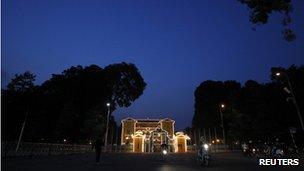Vietnam officials to face parliamentary confidence votes
- Published

Officials are trying to show they are accountable, observers say
The communist-dominated parliament of Vietnam is to subject elected leaders including the president and prime minister to annual confidence votes.
State media said those given a low vote by deputies for two consecutive years could be sacked.
Parliament's resolution comes a week after PM Nguyen Tan Dung dismissed a rare call by an MP to resign for errors in his handling of the economy.
Correspondents say the confidence vote may be no more than symbolic.
The BBC's Viv Marsh says that it is unclear whether parliamentary confidence votes will have any bite - because parliament does not have jurisdiction over the Communist Party, which wields much of the power in Vietnam.
However the 500-member communist-dominated National Assembly is gradually becoming more assertive.
According to a resolution now passed by the legislature, the prime minister, the president and other top officials it has elected or approved must in future face a parliamentary confidence vote every year.
Those who do badly for two years in succession will be subjected to a final vote and could be fired.
The authorities in Vietnam have been trying to deflect rising criticism - and show they are publicly accountable - as they grapple with a stagnating economy and a string of financial scandals.
Last week Mr Dung defended his mistakes and pointed out that the Communist Party had assigned him the job.
Correspondents say that the attack on the prime minister was so unusual because it was made in front of TV cameras in parliament.
Mr Dung was spared disciplinary action at a key Communist Party meeting in October over the scandals that have tainted his leadership.
- Published14 November 2012
- Published16 October 2012
- Published5 September 2012
- Published30 March 2012